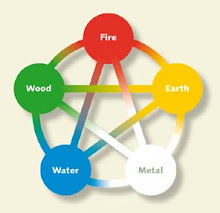
In our last entry, we gave information about the various acupuncture qualifications out there, and what they meant. Now, we will begin to highlight the basic differences between 'proper' acupuncture and, well...erm...NOT 'proper' acupuncture. It's not an easy task, so it will be rather simplified but, if anyone wants further or deeper information, just ask. Again, if we find that people want to know more, if you give us a hint, we will gladly give you enough to cure insomnia and maybe not need to come and see us!
The basic idea behind Chinese medicine consists of two aspects: The Tao (or Dao) and Qi (or Chi). The Tao roughly translates as 'path' or 'way' and represents the flow of life, a journey or movement. Famously, Lao Tzu (who first tried to describe the Tao) said the Tao that can be spoken of is not the Tao. What on earth does this mean? It sounds a bit like that Kung Fu stuff and grasshoppers of the late 70's. Well, in some ways this is easy to understand, although hard to describe. It's a case of knowing yourself, your world, what feels 'real' and what doesn't. Sometimes this means we have to accept the rough with the smooth as just a part of life; the trick is to understand what the rough and smooth are trying to tell you, what lessons you can learn from them and how to apply the knowledge as you go through life. Sounds easy. It's simple but, not necessarily easy. Getting through life cut-off and isolated is not good for us, whether it's the rough or the smooth. Letting go of outdated or unhelpful thoughts and behaviours, reaching out to others for help and support, trusting the Tao - all require lots of effort and application. However, the Tao would ask that we don't struggle to do that, it says we have to stop fighting and pushing and fitting ourselves into the mould labelled 'should' and ease into the shape that Is. In it's simplest form, Chinese medicine states that dis-ease comes from not being in the Tao.
Western medicine, on the other hand, tends to come from the ideas generated by early philosophers like Descartes and scientists like Newton. Throughout the last couple of hundred years, understanding and describing the body has been broken down into systems and their individual components, a bit like a car engine and it's parts. So, symptoms or problems in one of those parts get treated as separate from the whole. Also, the part is treated as if that is where the actual problem lies. Whilst this is not, in itself, a harmful approach, it does not fit all conditions. There are many symptoms we experience that are nothing to do with the body being incapable of managing; rather, the body is being so efficient it is telling us it has had enough and wants some care and attention. When medical research looks for better answers to our health questions, it tends to take this reduced approach and examine the symptom itself and the hoped-for treatment in isolation from a whole human. This is generally considered the best way to find the 'truth' of a treatment, that is, the complaint and cure are not seen as connected to a person at all. If the aim is to find the chemical that destroys a particular cancer cell, for example, this is an excellent approach and something Chinese medicine does not do. If the aim is to find out what is causing depression - well - it's a bit more complicated than saying "that nut does not fit that bolt".
It's important that we make ourselves (that is, Beeston Acupuncture) clear in what we aim to achieve here. We want patients to make a free, informed choice about the treatment they select, to feel confident that their practitoner has their best interests at heart. In other words, if the best course is conventional medicine, we will tell you. Similarly, if we feel that acupuncture can offer you a better chance, or at least an improved chance, we will say. Any good acupuncturist would be the same - this is not just our approach but that of most of our properly qualified and experienced colleagues.
In the next post we shall explain more about Qi, and how we work with it as acupuncturists.


No comments:
Post a Comment